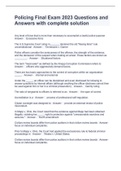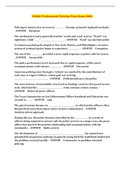Policing final exam - Study guides, Class notes & Summaries
Looking for the best study guides, study notes and summaries about Policing final exam? On this page you'll find 138 study documents about Policing final exam.
Page 3 out of 138 results
Sort by
Policing Final Exam 2023 Questions and Answers with complete solution
Final exam police and policing | 162 Actual Questions and Answers 100% Verified
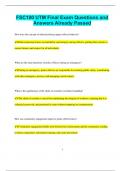
-
FSC100 UTM Final Exam Questions and Answers Already Passed
- Exam (elaborations) • 13 pages • 2024
-
Available in package deal
-
- $9.99
- + learn more
FSC100 UTM Final Exam Questions and Answers Already Passed How does the concept of ethical policing impact officer behavior? Ethical policing fosters accountability and integrity among officers, guiding their actions to ensure fairness and respect for all individuals. What are the main functions of police officers during an emergency? During an emergency, police officers are responsible for ensuring public safety, coordinating with other emergency services, and managing crowd contro...
TCOLE Professional Policing Final Exam 2023...

-
Criminal Investigations - Final Exam (Review of all exams)
- Exam (elaborations) • 29 pages • 2024
-
- $9.99
- + learn more
Criminal Investigations - Final Exam (Review of all exams) Which of the following best describes circumstantial evidence? - A hair found on the victim that does not belong to the victim Which of the following best describes the Locard's Exchange Principle? - Primarily the contact between two items normally leaves behind a trace evidence Three conceptual approaches to current policing styles are: community-oriented policing, problem-oriented policing, and ______ policing - Intelli...
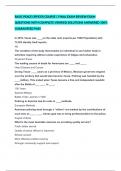
-
BASIC PEACE OFFICER COURSE | FINAL EXAM REVIEW EXAM QUESTIONS WITH COMPLETE VERIFIED SOLUTIONS ANSWERED 100% GUARANTEED PASS
- Exam (elaborations) • 31 pages • 2024
-
Available in package deal
-
- $9.49
- + learn more
BASIC PEACE OFFICER COURSE | FINAL EXAM REVIEW EXAM QUESTIONS WITH COMPLETE VERIFIED SOLUTIONS ANSWERED 100% GUARANTEED PASS In 2019, Texas was ____on the state rank (reports per 100K Population) with 73,553 identity theft reports. 4th The condition of the body that enables an individual to use his/her body in activities requiring without undue experience of fatigue and exhaustion. Physical Fitness The leading causes of death for Americans are ____ and ____. Heart Disease and Cancer Dur...
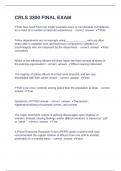
-
CRLS 3300 FINAL EXAM Questions with complete solution 2024/2025
- Exam (elaborations) • 9 pages • 2024
-
Available in package deal
-
- $13.49
- + learn more
CRLS 3300 FINAL EXAM Questions with complete solution 2024/2025 CRLS 3300 FINAL EXAM PTSD may result from one single traumatic event or can develop cumulatively as a result of a number of stressful experiences. - correct answer TRUE Police departments are increasingly using _____________, who are often better able to establish trust and legitimacy compared to outsiders or psychologists who are employed by the department. - correct answer Peer counselors Which of the following offic...
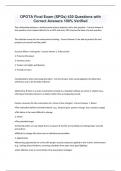
-
OPOTA Final Exam (SPOs) 430 Questions with Correct Answers 100% Verified
- Exam (elaborations) • 131 pages • 2024
- Available in package deal
-
- $11.99
- + learn more
OPOTA Final Exam (SPOs) 430 Questions with Correct Answers 100% Verified The relationship between a student performance objective and a test question - Correct Answer A test question must respond directly to an SPO and every SPO may be the basis of a test question The ultimate reason for law enforcement training - Correct Answer To be able to protect life and property of yourself and the public A peace officer's main goals - Correct Answer 1. Enforce laws 2. Preserve the peace 3. Preve...
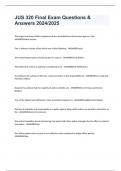
-
JUS 320 Final Exam Questions & Answers 2024/2025
- Exam (elaborations) • 7 pages • 2024
-
Available in package deal
-
- $8.49
- + learn more
JUS 320 Final Exam Questions & Answers 2024/2025 The largest and most visible component of any municipal law enforcement agency is the - ANSWERSPatrol Section. Part 1 offenses include all but which one of the following: - ANSWERSFraud. The United States system of policing has it's roots in - ANSWERSGreat Britain. The bedrock of early U.S. policing is considered to be - ANSWERSThe Political Era. According to the authors of the text, crime prevention is the responsibility of - AN...
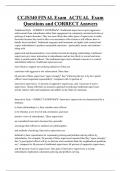
-
CCJS340 FINAL Exam ACTUAL Exam Questions and CORRECT Answers
- Exam (elaborations) • 12 pages • 2024
-
- $9.99
- + learn more
CCJS340 FINAL Exam ACTUAL Exam Questions and CORRECT Answers Traditional Style - CORRECT ANSWER- Traditional supervisors expect aggressive enforcement from subordinates rather than engagement in community oriented activities or policing of minor disorders. They are more likely than other types of supervisors to make decisions because they tend to take over encounters with citizens or tell officers how to handle those incidents. Traditional sergeants and lieutenants are highly task ori...

$6.50 for your textbook summary multiplied by 100 fellow students... Do the math: that's a lot of money! Don't be a thief of your own wallet and start uploading yours now. Discover all about earning on Stuvia

